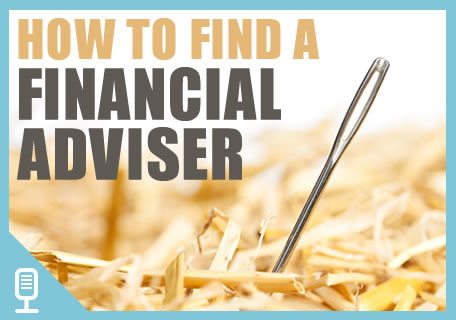 In this session of the MeaningfulMoney Podcast, we’re going to be talking about how to find a financial adviser.
In this session of the MeaningfulMoney Podcast, we’re going to be talking about how to find a financial adviser.
This website was set up to provide information, so that those who wanted to do could do their own financial planning. If you know about all the different types of life assurance, for example, and how each one is right in certain circumstances, then maybe you can choose the one that’s right for you.
But even given the enormous amount of information on my site and the internet as a whole, many people will still be best served by engaging with a competent financial planner.
So in this session I’m going to show you how to find a financial adviser who is right for you.
Click to Listen
Podcast: Subscribe in iTunes | Play in new window | Download
Introduction
Financial advisers are a funny bunch. Historically, we haven’t exactly covered ourselves in glory. There have been mis-selling scandals, incompetence and blatant scams.
But if you asked many of my clients, they would tell you that they trusted me with their lives, and that I know more about them than their kids do! Some of my clients have banned me from retiring until after they have died!
I have a fantastic relationship with my clients: I don’t overcharge them; I add value to their wealth by making sure they are investing in a tax-efficient way.
There are thousands of advisers like me; honest, professional, good at their jobs. But how do you find those advisers, and avoid the sharks?
Everything you need to KNOW
Let’s look first at everything you need to KNOW, in order to be equipped to find a financial adviser
1 – Pick your way through the alphabet soup
Advisers use many different designations on their business cards, you need to understand what they mean. It’s important to know though that higher qualifications do not a good adviser make.
Until January 2013, the entry level for financial advisers was QCF Level 3, which is apparently broadly similar to an A-level. I don’t reckon this is high enough for someone with access to all your financial information, particularly when compared to the accountancy and legal professions.
Neither do the regulator, which is why the minimum level is now QCF Level 4, which is roughly equivalent to Certificate in higher education.
I reckon this is only a step along the way to the eventual requirement to have a Level 6 qualification, which is equivalent to a full bachelor’s degree
How do advisers annotate these qualification levels on their business cards?
Level 4 is called Diploma level, so look for DipPFS, or DipCII, or DipFA – common theme is Dip for Diploma. The back half of the designation refers to the awarding body.
Level 6 advisers are the top-flight. Usually they will have one of two titles:
- Chartered Financial Planner
- Certified Financial Planner
Both have the same acronym, but only the latter can legally be shortened to CFP.
There are only about 1000 advisers with both designations I think. There is a difference between the two designations. Chartered Financial Planners have sat and passed exams. Certified Financial planners have passed exams too, but have also been taught to how to write comprehensive, holistic financial plans – in other words, how to apply their exam knowledge to real-life scenarios
A CFP always the best option if you can find one.
2 – Specialist or a generalist?
This depends on circumstances. Most people present to an adviser with one issue they need sorting. Perhaps they have received an inheritance, are having a new baby, are approaching retirement, or have a parent needing long term care.
Most advisers have a good base knowledge about how to deal with any general financial need. They will also know where to look if they are weak on a particular subject.
Financial advice is best done with an unfettered view of your financial health. CFPs particularly are trained to ask questions around the subject to dig deeper. That said, certain aspects of financial planning are specialist areas.
For example, I am fairly weak at pensions. I can deal with the basics no problem, but anything a bit more challenging I usually refer to one of my colleagues. Likewise, if they have a case where a trust is involved, they tend to ask me as I have the most experience of using and working with trusts in the firm. We usually refer mortgage enquiries to a local mortgage broker because we’re not specialists in that area of advice.
One-man-band advisers can’t be specialists at everything, so there is merit in working with a multi-discipline, multi-adviser firm. Or pick an adviser who knows his limits and drafts in specialists where necessary.
A good analogy is that a GP will have a good knowledge of most medical ailments, but when it comes to dealing with many of them, she will refer you to a specialist.
Determine your particular need and try to find the best adviser for that need
3 – There are many tools for finding advisers, but also ask your friends and trust your gut
There are four sites that you can use to search for advisers in your area:
- Unbiased.co.uk has a huge database, which includes other advisory professions such as accountancy and law. Advisers can pay for enhanced listing, and these get bumped to the top of the site results.
- FindAnAdviser.org – This is the site of the Personal Finance Society, the largest industry body. This will list Chartered Financial Planners at the top of its listings, which is fine by me 😉
- financialplanning.org.uk Find a Planner – This is the site of the Institute of Financial Planning, and here you can search for CFPs or Accredited Financial Planning Firms.
- VouchedFor.co.uk – The TripAdvisor of the financial advice world. Advisers are reviewed by their clients
Try those sites by all means, but the best starting point by far is to ask friends or family who have recently seen an adviser about their experience. This is especially valuable if they are in similar financial position to you.
Everything you need to DO
So let’s now deal with what you need to DO to find a financial adviser
1 – Check out a prospective adviser on the FSA Register
Note: The Financial Services Authority (FSA) becomes the Financial Conduct Authority (FCA) on 1st April 2013.
All authorised advisers are listed on an online register, and it’s easy to search for your prospective adviser by name, by company name, or by their reference number (you’d need to ask them for this).
Why is it important to do this? Well, you can check that they are authorised for a start. There are bound to be many con artists who claim to be advisers, but who are no such thing.
Secondly, you can check you prospective adviser’s disciplinary history. If they have ever fallen foul of the regulator, it’ll be on their record with the FSA.
I have recorded a video walkthrough of how to do this in Episode 271
2 – Meet with your prospective adviser
This is a chance for you to interview your prospective adviser, and for her to interview you, to see if you are a good fit. Before the meeting, make sure you know and can articulate why you are seeking advice. Here are five questions to ask:
i. Can you describe your advice process?
The financial advice process will look quite similar from one adviser to the next, but your prospective adviser will have her own way of explaining it. You need to be happy with the process and know what to expect.
ii. How and when do you get paid?
All advice fees are now agreed between you and the adviser. Advisers used to be able to be paid via commission, but this has now been abolished except on some protection policies. You obviously need to know the likely cost of the advice process before you incur it.
Bear in mind though that every client is different and your adviser may not be able to give you exact figures when first meeting you, as she doesn’t yet know your situation and the likely complexity of the advice you need.
iii. Why do you do this job?
The best advisers see financial planning as a calling. If you get an answer like ‘I fell into it after leaving the army’, then dig deeper. What do they like about the job? What do they find the most rewarding part of the job?
iv. What are your qualifications or specialisms?
The adviser’s business card may detail these, but ask anyway and get them to explain. Are they aiming higher? If they are ‘only’ diploma level, are they working towards Chartered or Certified status?
The best advisers are always seeking to better themselves.
v. Can you describe your ideal client?
This will tell you a great deal about your adviser. For example, I like to work with Delegators; Family-oriented people; Good decision makers who can stick to their decisions. If you don’t match the description the adviser givers you, the relationship will be more fraught than it needs to be.
3 – Trust your gut
Humans are wired to pick up non-verbal cues when communicating with other humans. I’m a big believer in trusting your gut instinct. If, when you meet your prospective adviser, you don’t think you like them, or can’t trust them, walk away. Even if you’re not sure why you feel that way, but you know something’s not right, walk away.
The feeling’s probably mutual in any case, so may as well cut your losses now before you have spent any money on adviser fees.
4 – Open up!
If you do decide to work with an adviser, hold nothing back. Your adviser will serve you best if she has an unrestricted view of your current financial situation and your hopes, dreams and fears.
So don’t be afraid to share freely, all information disclosed will of course be confidential.
Summary
So that’s how to identify an adviser and see if you want to work with them. The relationship with your adviser can become a deep and trusted friendship. I have attended the weddings of clients, and a few funerals too. I’ve been thanked by the children of a deceased client for everything I have done for their family. And I’ve lost count of the times I have been told that I know more about my clients than their kids do – what a privilege!
I have an eBook coming out shortly that will give more detail, and particularly going into the financial advice process and how it works, so that you know what to expect. It’ll be a free download and I’ll announce it on the podcast and on the site when it is ready.
Follow me on Twitter @petematthew (I tend to chat a lot with this account) or @meaningfulmoney for up to date information on this and everything else to do with MeaningfulMoney.
Outro
I hope that this session of the MM podcast was helpful. Did I miss anything? Do you have any tips or tricks that work for you? Any questions? Please leave any comments or questions in the comments section below.
Also, if you like what you hear on this podcast, please leave a rating or review on iTunes. this helps others to hear about the show and to subscribe.
Next time we’ll be talking about Risk and how to deal with it. If you have any questions about this, go to meaningfulmoney.tv/feedback and leave a voicemail.
Thanks for listening – I’ll talk to you next time



[…] Meaningful Money […]